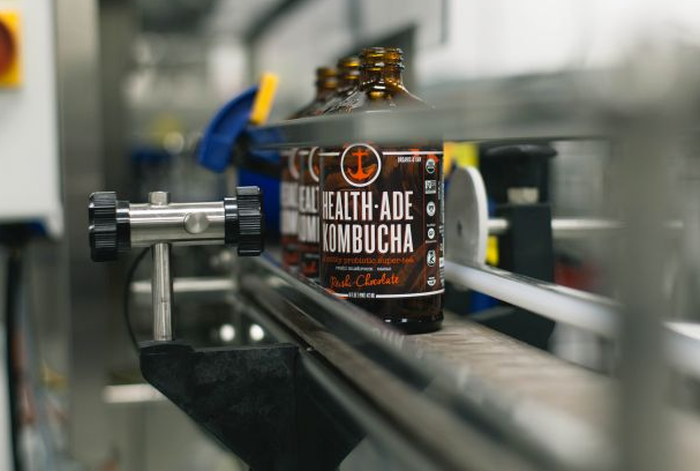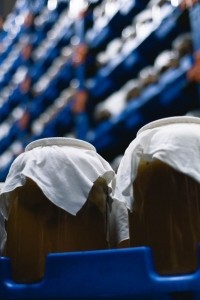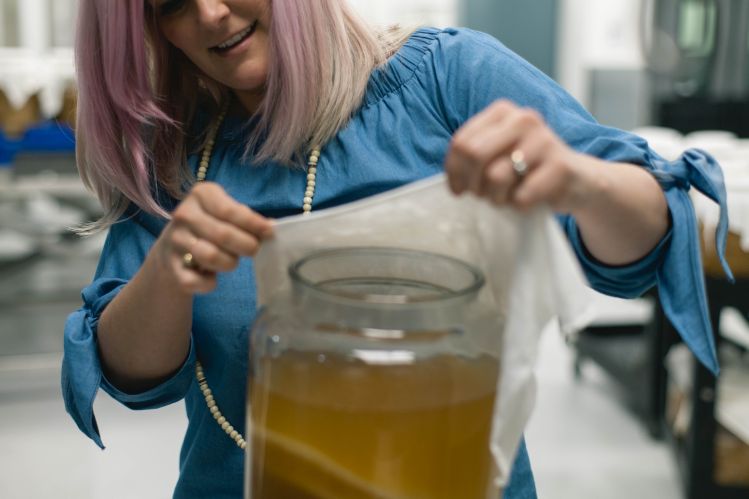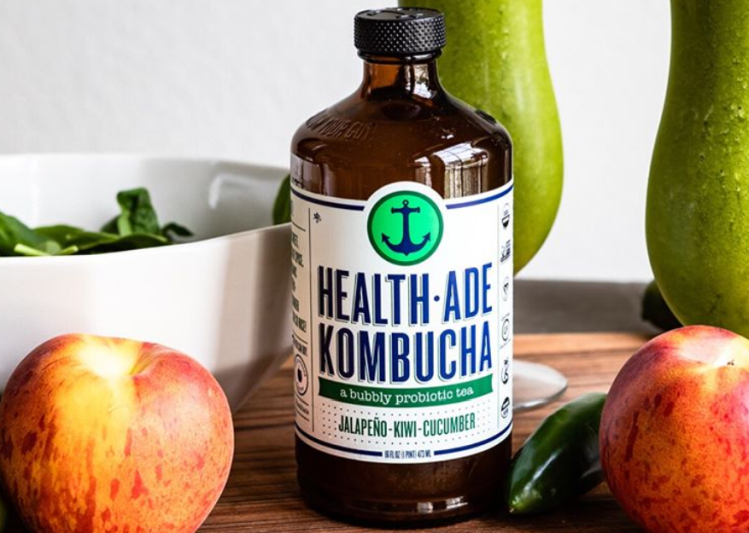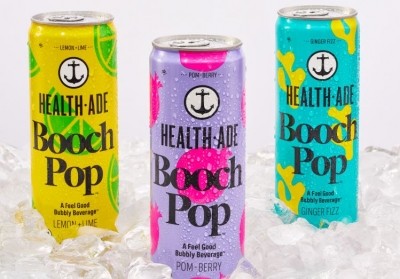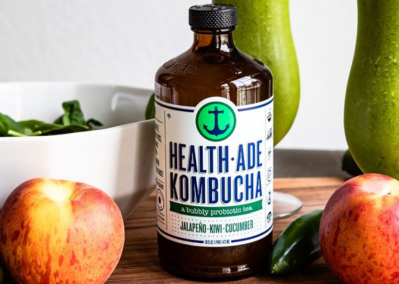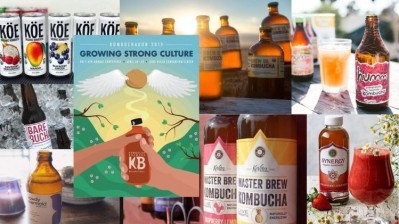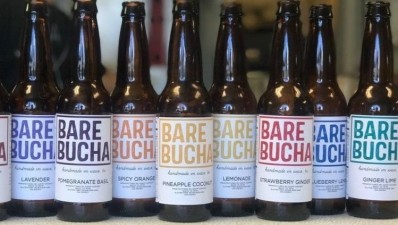Health-Ade Kombucha CEO: ‘We’re building a plane and flying it full speed at the same time’
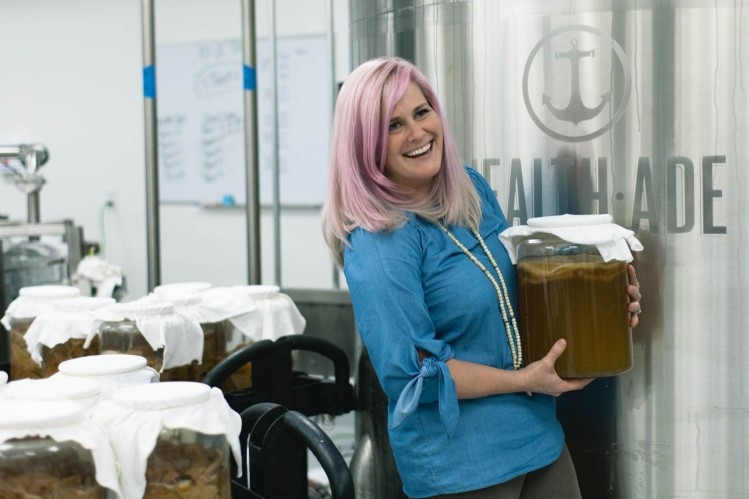
But while numbers like that would probably have sent most bean counters running for the hills, the fact her bubbly fermented tea was also selling like hotcakes proved she was onto something, and the company has not taken its foot off the gas for six years, says Trout, with production volumes more than doubling to 80-90,000 cases/week in the past eight months alone.
While Health-Ade is still not profitable, scale and automation have transformed the above equation [it's now supplying 15,000 stores], and the company has a clear path to profitability, stresses Trout.
“Our investors understand that it takes capital to scale a business like this and that we’ve pushed very hard to get into that top three spot [behind GT’s and KeVita]. But everything has changed since we started, from the price we’re paying for raw materials to the efficiency of the process.
“We used to buy filtered water from Whole Foods, whereas today we have our own reverse osmosis system. The cost of organic cane sugar, tea, and fresh produce also goes down significantly once you start buying by the pallet. Then you’ve got the bottles, the labels, and the caps. Today we have high speed filling lines doing 700 bottles a minute; when we started we were literally filling them by hand siphoning.
“The way we move our jars around is also significantly different. Instead of choosing to expand our vessel size, we’ve looked at more efficient ways to handle them [think pallets and forklifts vs staff lugging individual jars onto shelves].”
It all started with $12.99 cookie jars from Bed, Bath & Beyond...
But why stick with 2.5 gallon jars? While ‘small batch’ might resonate with consumers, aren’t there more efficient ways to produce kombucha without compromising your integrity?
Perhaps, says Trout, but when you’re “building a plane and flying it full speed at the same time,” it’s not easy to change course.
“It all started with $12.99 cookie jars from Bed, Bath & Beyond, and we built all of our processes around them. To move away from those jars would take a ton of investment now, although I’d be open to it if I can maintain the product quality. We’re not tied to a 2.5 gallon jar.”
There’s no 1-800 Kombucha number you can call
The ongoing conversations about compliance (controlling alcohol and sugar levels) also serve as a reminder that making kombucha at scale is still a relatively new enterprise for the food industry, in which most startups typically outsource production to co-packers once they outgrow a commercial kitchen, leaving the founders to focus on building the brand.
For Health-Ade, and many rivals, however, there was no convenient list of co-packers to call when kombucha really started to take off, and its founders had to learn on the job… while flying at full throttle, says Trout.
“We hired the one expert we found [chief product officer Ramon Canek], who used to be the COO of Millennium Products [market leader GT’s Kombucha], but there’s no 1-800 kombucha line you can call.
“There are fermentation scientists out there in the brewing industry, but their expertise doesn’t translate as well as people thought it would to kombucha. It’s an art as much as a science, it’s its own kind of beast.
“Going back to the jars, just because something works in a 2.5 gallon jar doesn’t mean you can get it to work in a jar twice the size. I’m sure there’s a way for us to find a solution for larger batches, but I could never get it to ferment the same way with bigger batch sizes. There was something about the small batch that worked and we stuck with it.”
Health-Ade Kombucha was founded in 2012 by Daina Trout, her husband Justin, and her best friend Vanessa Dew, who started selling their wares at the Brentwood Farmers Market with a SCOBY (symbiotic culture of bacteria and yeast) from Kombucha Kamp and have gone on to create the #3 brand in the market with distribution in natural, conventional, club, and convenience channels.
To date, the company – which is based in Torrance, CA – has raised $29.1m in three funding rounds, with backers including CAVU Venture Partners.
Premium products are driving sustainable growth in the kombucha category
Right now, the kombucha market is continuing to notch up double-digit growth (US retail sales of refrigerated kombucha and other fermented beverages surged 37.4% in 2017 according to SPINS data). That said, it’s probably harder for new brands to secure shelf space today than it was a couple of years ago, claims Trout, although regional brands outside the coasts are still well-placed to enter the category, she says.
Retailers typically see the kombucha category through the lens of premium, mass market, and local, argues Trout, who says Health-Ade’s distinctive glass bottles, organic positioning, traditional production methods and unique flavors position it firmly in the premium segment.
I don’t think there’s been an episode of Portlandia that doesn’t mention kombucha…
But what's the attraction of a slightly sour-tasting beverage that can be polarizing, and typically carries a pretty premium price tag?
Kombucha isn’t for everyone, she says, but it’s much lower in sugar than soda, it’s bubbly, and it tastes way more interesting - which has intrigued a new generation of shoppers looking for more bold and adventurous flavor profiles and culinary experiences, says Trout.
But it's also produced in a way that really engages people (there's something strangely alluring about a jar with a SCOBY floating on top), in the same way that craft beer and other small batch fermented products have captured the public imagination.
“I still see enormous growth potential, particularly for premium kombucha. Higher earning Millennials on the coasts are still a key target audience - I don’t think there’s been an episode of Portlandia that doesn’t mention it somewhere - but it’s like any health movement. It started on the coasts, but it’s spreading, because more and more people are avoiding high sugar drinks that don’t have any functionality.”
She adds: “Our consumer base skews a bit female, around 60-70%, but when you look at who clicks on digital ads, it’s more like 50:50 male/female. If we can figure out how to make the economics of refrigerated ecommerce work, then it’s just going to go everywhere.”
The production process:
First Health-Ade filters tap water via reverse osmosis to remove chlorine, fluoride, antibiotics and other things that could harm the micro-organisms used to make kombucha. Then it brews organic green and black tea, adds sugar, lets it cool a little, and then pours the sweet tea into 2.5-g glass jars, adds a SCOBY (symbiotic culture of bacteria and yeast), which floats on top, covers the jars with t-shirt material, and leaves them to ferment at around 80-85˚F for about a week – as the company monitors sugar levels, pH, taste and other factors to decide when to move to the next stage of the process.
This first phase of the fermentation creates carbon dioxide (which dissipates out through the t-shirt material), alcohol (the yeasts in the SCOBY convert some of the sugar into ethanol), acetic acid (explaining the slightly sour, vinegary taste) and other organic acids such as malic acid, tartaric acid, glucuronic acid and gluconic acid. New ‘baby’ SCOBYs are also born during this process. The tea, now full of complex acids, is flat, not bubbly, then gets mixed with cold-pressed juice before moving through a system of tanks and pipes to the bottling room.
A shorter secondary fermentation takes place in the bottle whereby residual yeast convert some of the remaining sugar in the tea plus sugar from the juice into more alcohol and CO2, and bacteria convert some of the alcohol into acids, but this time, the carbon dioxide cannot escape, creating bubbles. After a certain period of time (it’s different for each flavor), the product is then refrigerated (which stops or dramatically slows any remaining fermentation still happening in the bottle) and transported through the cold chain to customers.
Kombucha is fermented tea: 'I am a purist'
Kombucha is typically defined as a fermented tea, whereby firms ferment sweet tea with a kombucha culture or SCOBY (see box above). Individual brands may also add herbs, fruit juice, and other ingredients, before or after the fermentation.
The devil, however, is in the detail, with some companies - including Health-Ade - making a virtue of the fact that their kombucha is 'raw,’ and others such as KeVita heat pasteurizing their kombucha (in part to create a consistent product with an alcohol level below the legal threshold of 0.5% abv throughout the shelf life) and adding in well-characterized strains of probiotics afterwards, for example.
Some firms use micro-filtration techniques to filter out some yeast (to stop the product continuing to ferment in the bottle and increasing the alcohol content – although this means they would then need to force carbonate the beverage, notes Trout), while others (Brew Dr Kombucha, Aqua ViTea) distill off some alcohol after the fermentation.
'A heat pasteurized kombucha is better than a really sugary soda'
Other brands such as Suja use a low heat, which they claim kills off residual yeast, but does not destroy beneficial bacteria remaining in the brew post fermentation. Still others now combine kombucha with coffee, honey, coconut water or other bases, generating an intense debate within the industry as to what, exactly, 'authentic' kombucha is, and who should decide.
Health-Ade can’t tell other brands how to make or market their products, acknowledges Trout. But many consumers have embraced kombucha because it's a living, breathing, food, and because they are actively seeking out 'raw' fermented products, she claims.
“I’m a purist and I have a view on what ‘real’ kombucha is and that’s tea fermented with a SCOBY. If you heat pasteurize your kombucha, or if you use concentrates, you should say so. But even a heat pasteurized kombucha is better than a really sugary soda.”
Kombucha, alcohol, and the 0.5% abv threshold: 'I believe the law will change'
Health-Ade which like several other players in the segment, has been sued more than once over sugar and alcohol levels in its products), is “very confident in our process [for controlling alcohol levels at below 0.5%abv],” insists Trout, who cannot comment on the pending litigation.
But as a member of Kombucha Brewers International (KBI) (a non-profit trade association for the industry), she is also passionate about efforts (the Kombucha Act) to increase the threshold at which kombucha is classified as an alcoholic beverage (and must be taxed and labeled accordingly) from the 0.5% to 1.25% abv.
“I’m an optimist; I believe it will happen and it needs to happen,” claims Trout. “All fermented foods that are made with yeasts make some alcohol, and to me, to say they need to be classified as liquor if they have these very low levels of alcohol doesn’t make sense; that’s not why people consume them. Other countries allow this kind of variance for these kinds of functional foods.”
She adds: “Let’s not limit these companies, they’re not inebriating anybody. We want a food system that supports living foods that nourish the microbiome, not just sterile foods, as long as they are safe.”
Probiotics and kombucha: 'We have at least six to eight known probiotics in our kombucha'
Asked about the trend among some fermented food brands to promote their wares as ‘probiotic’ when they do not know what bacterial strains are actually in their products and do not have any evidence that the live micro-organisms therein survive and reach the large intestine in adequate amounts to confer a health benefit on the host (to meet the WHO definition of probiotics, for example), Trout says:
“We know what's in our product. We’ve done DNA sequencing of our kombucha that identifies what’s in it, and shows there’s enough [probiotics] in there to confer a health benefit."
Asked whether the phrase ‘a bubbly probiotic tea’ – used on the front of Health-Ade bottles - was nevertheless problematic given the legal scrutiny kombucha labels are now subject to, Amelia Winslow (director of project management) acknowledges that Health-Ade has not conducted clinical trials to prove consumers of its kombucha experience health benefits, but says it has the data needed to use the term 'probiotic' on pack.
“We have at least six to eight known probiotics in our kombucha, but we don’t say anything more [beyond 'a bubbly probiotic tea']; we don’t make specific health claims. But absolutely, having the word ‘probiotic’ on the label is backed up by the fact that if you tested any of our bottles you would find millions and billions of what the scientific community views as a known probiotic, and that’s all we are held to.”

